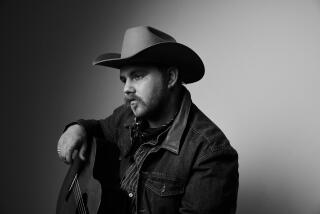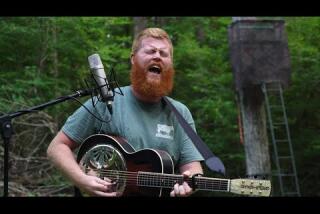In Sierra Leone, pop music is a beat that drives politics
- Share via
Reporting from Freetown, Sierra Leone — Everywhere he went in Freetown’s ghettos, a dreadlocked young vocalist named Innocent heard the plea. People were fed up with lies, theft and corruption. This government had to go, they said, and they begged Innocent to speak out.
So late one night, Innocent drove to Forensic Studios, a rundown pair of rooms on a clamorous downtown street. The sound engineer was asleep on an old sofa, and Innocent shook him awake.
“Let’s do something,” Innocent said, “and release it tomorrow.”
The single “Injectment Notice” -- “eviction notice” in the lingua franca of Sierra Leone -- helped spark a ballot-box rebellion in 2007. “I told people: If you don’t like this government, vote them out,” he said. “And it actually happened.”
Sierra Leone’s engaging blend of hip-hop, Afro-pop and reggae sounds flourished after the end of the brutal, decade-long civil war in 2002, and the number of radio stations playing those tunes swelled from nine to more than 50.
Today, music here is more than simple entertainment. It has become the vehicle for a decibel-busting national political debate. With the sixth-highest rate of illiteracy in the world and a deep suspicion of the ruling elite, Sierra Leone’s 6 million people rely heavily on their pop stars -- often educated and well-traveled -- for an independent take on what’s going on.
“These songs are the only way the masses have of expressing what they want to say,” said Emrys Savage, a record producer and former DJ who wears Che Guevara T-shirts and goes by the name King Fisher. “For us, it’s all about bringing social change.”
In recent weeks, though, Innocent, a grandson of Nigeria’s Afrobeat mega-star Fela Kuti, has been locked in a musical smack-down with one of the country’s most famous singers, Emmerson Bockarie, over a question much of the nation is asking: How is the new government doing?
The answer isn’t so clear in a fledgling democracy with vast unmet needs and high expectations, a nation where the new government felt compelled to create an Office of Attitudinal Change to inspire patriotism. “Our goal is to remake and rebrand the image of this country” and encourage Sierra Leoneans to change their “bad attitudes,” said Allieu Kamara, a former Washington insurance salesman who runs the office.
Both Innocent and Emmerson had helped light the fire that consumed the last government. Even before Innocent released his protest song, Emmerson had recorded “Borbor Bele” (“Pot-Bellied Boy”), which speared corpulent politicians who sold themselves to the highest bidders.
The protest song industry largely fell silent when President Ernest Bai Koroma of the All People’s Congress took office in 2007, riding a wave of promises to end corruption, improve healthcare and bring electricity and clean water to the hundreds of thousands of Sierra Leoneans without it.
Emmerson, for one, had high hopes. “I was confident that this government would bring about change, and that’s why I kept silent,” he said. “I really believed.”
But when he returned from a U.S. tour a few months ago, he didn’t like what he saw. “It’s been more than two years and we’re still not seeing any foundation or any road being built to change,” he said. “This government is feeling too comfortable and too loved. They need to work harder.”
Emmerson went back to the recording studio and laid down the track for “Yesterday Betteh Pass Tiday” -- “Yesterday Was Better Than Today.”
“Whenever we think we have a savior,” he sings, “we see a government that betrays the people. Maybe tomorrow will be better, but no one knows tomorrow. I don’t know about you, but my yesterday was better than today.”
That message of discontent touched off a firestorm.
Emmerson is “simply the best lyrical musician in Sierra Leone,” said the editor of the New Citizen newspaper, but to argue that yesterday is better than today “is absurd.”
Within days, Innocent recorded a riposte to Emmerson. The single was titled “Leh Wi Gi Dem Chance” -- “Let’s Give Them a Chance” -- and Innocent performed it to wild applause at a ceremony where President Koroma inaugurated a new hydroelectric plant.
“The only way Sierra Leoneans feel complete these days is when they hear a song about how bad things are,” Innocent said. “But I don’t want to lie to the people.”
Government supporters have snapped up Innocent’s song; the opposition, which includes the Sierra Leone People’s Party driven from office in 2007, have raced to buy Emmerson’s record.
As often happens in Sierra Leone, rumors began to swirl. Emmerson accused radio DJs of taking bribes not to play his song. Some speculated that Innocent was taking as much as $2,000 from the government, a charge he denies. Others said Emmerson was getting an equal sum from the former ruling party, which he likewise denies.
“It takes only a song to split Sierra Leone and get sane-headed individuals to, overnight, manifest parochial political alliances,” the Sierra Express Media website observed in November. It warned that the musical skirmish could have dangerous consequences for a country that is “a powder keg which is liable to explode at any time in an orgy of senseless killings and recriminations.”
Not incidentally, perhaps, the records were released just as Sierra Leone’s vast, well-heeled diaspora in the United States and Britain returned home for the holidays. “All the hype has been good for sales,” said Savage, the record producer, who has not taken sides in the fray.
Emmerson, 30, and Innocent, 25, say it is a philosophical disagreement, not money, that is at the heart of their latest songs. They note that they took a considerable personal risk to launch musical attacks on the previous government.
Emmerson grew up on a hill overlooking Freetown, the capital, and came of age as the civil war was winding down. He was inspired to write his first protest song while commuting in public minivans to college and listening to riders lament the growing gap between rich and poor and the rise in government corruption.
He says he intended his most recent song as an early take, but not the final word, on Koroma’s government. “If they do something that I can praise them for, I’d love to praise them,” he said. “I’d love for them to prove me wrong.”
Innocent, whose real name is Prince Kuti-George, grew up singing duets with his brother in the church choir. But his worldview was heavily influenced by his grandfather, Fela Kuti, whose Afro-funk music is celebrated in the current Broadway musical “Fela!” Fela was highly critical of his country’s military rulers, who often tossed him into jail for his biting lyrical commentary. He died of AIDS in 1997.
Having helped bring down one government, Innocent said he believes that musicians have a responsibility to keep a watchful eye on this one. When the government said it was building a new road, he went to see it. When the president appeared in public, Innocent has been on hand, watching and listening.
“I’m taking notes,” he said. “If the president doesn’t do what he promises, I will definitely go back into the studio. People will hear it from me.”
More to Read
The biggest entertainment stories
Get our big stories about Hollywood, film, television, music, arts, culture and more right in your inbox as soon as they publish.
You may occasionally receive promotional content from the Los Angeles Times.











